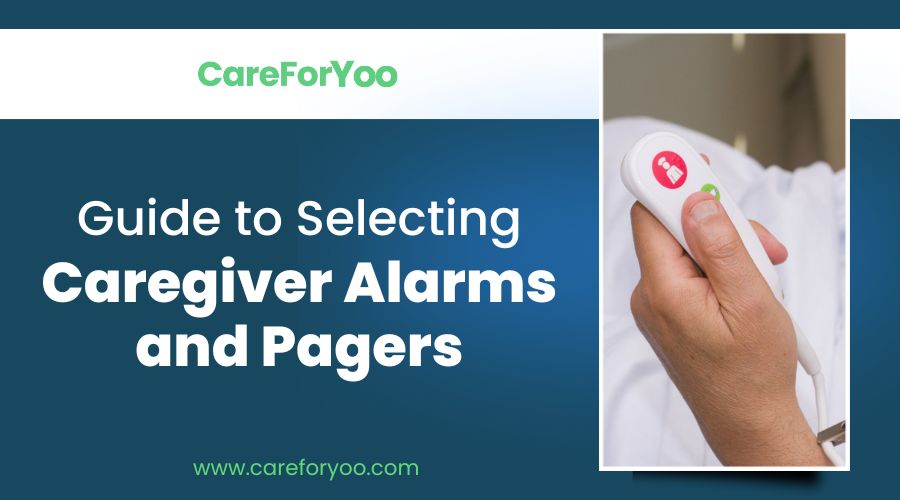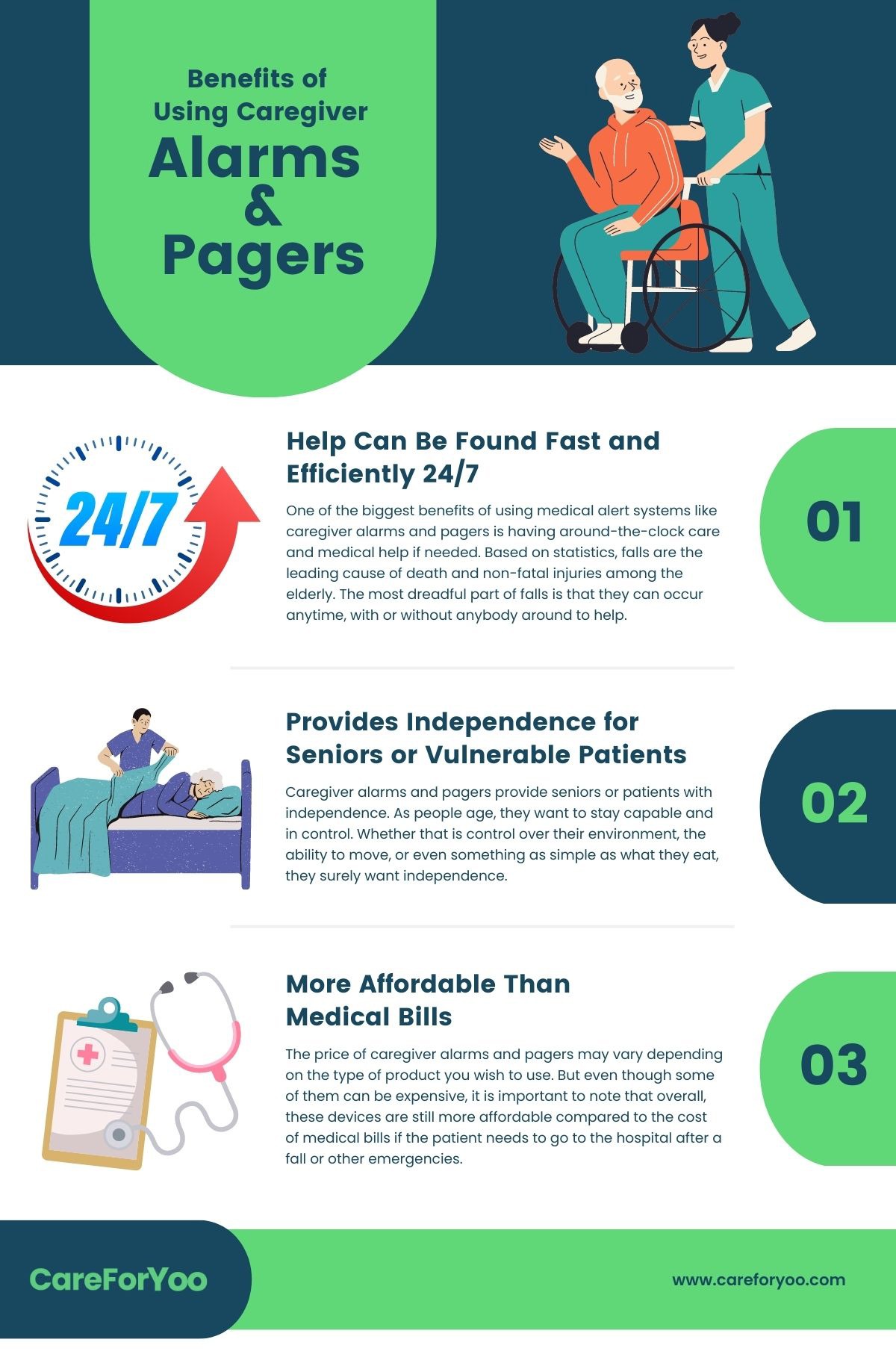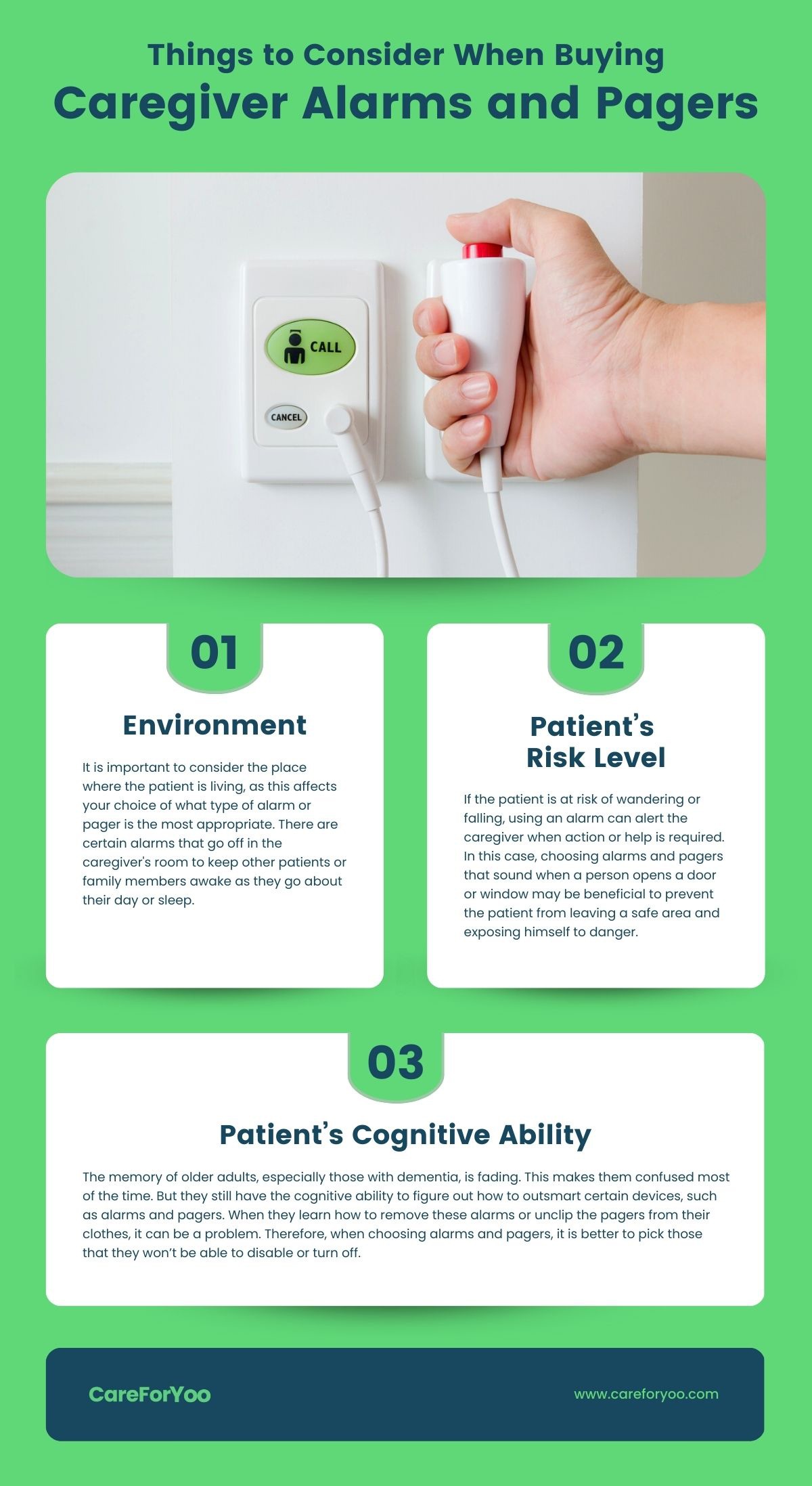Taking care of the elderly can be challenging, particularly for those who have developed Alzheimer’s disease and other complications with a person’s memory. It’s because you need to monitor their movements at all times and ensure that they do not wander around the house or outside, as these may lead them to accidents or injuries. Their condition makes the job of a caregiver tough, as there are nights when they are unable to sleep as they always need to see that their patient is closely watched and taken good care of.
There are circumstances wherein the elderly will not be able to call for help by yelling or screaming. But thankfully, there are a lot of products available today that can make the task of caring for the elderly much easier. These products will allow caregivers to be comfortable to get a bit of sleep. Among these products are caregiver alarms and pagers. These are devices that can help caregivers become alert and aware of their patient’s activities. They are perfect for situations where the caregiver would not be able to pay attention to the elderly such as while they are doing other chores or while sleeping.
We can assist you if you are considering purchasing caregiver alarms and pagers but are unsure of which ones to pick. We are providing you with a selection guide for caregiver pagers and alarms in this article.
What are Caregiver Alarms and Pagers?
If your patient who has Alzheimer’s disease or other types of dementia wanders and tries to leave their room, house, or facility, one of the ways for you to be informed is through the use of alarms and pagers.
Caregiver Alarms
Caregiver alarms come in different types. There are those that can be placed on doors, on the bed, and on the chair. Patients who have trouble moving about and have a higher risk of falling also utilize these alarms. This is because falls can occur when the elderly are getting in and out of bed or moving from one chair to another. Instead of putting locks on doors that the elderly won’t be able to reach, caregiver alarms will alert you if they need your assistance while still allowing them to exit through the door in case of emergencies.
These alarms can help caregivers protect patients from wandering alone, especially those who are at risk of going out without the needed supervision. Aside from that, caregiver alarms can also be utilized to alert others for assistance. For instance, an alarm may be placed on a bathroom door, and it will sound when the door is opened, alerting the caregiver that the patient needs assistance in the bathroom.
Caregiver Pagers
Caregiver pagers are also called pager alert systems. They are a variety of devices that transmit an electronic signal to a receiver unit that provides a recipient with information. The common element in pager alert systems is that they give an alert that a situation has arisen and it requires action. [1]
These pagers are available in different configurations. It can be a simple pendant with a button that transmits a radio frequency signal to a receiver when pushed. The receiver then might flash a light, make a noise, or both, to alert the caregiver to the need for attention or action.
There are also more sophisticated systems that include pressure-sensitive mats that can be placed by a bed or doorway and will activate an emergency alert when stepped on. Some caregiver pagers can also automatically dial prerecorded telephone numbers to alert caregivers, police, family members, or any preferred responder. Some medical monitors can also be linked with a pager alert system to send a call or alert if a potentially dangerous medical condition occurs. [1]
Benefits of Using Caregiver Alarms and Pagers
Caregiver alarms and pagers can keep your patients safe, give you peace of mind, and help you focus on other tasks at hand. Below are some of the key benefits that are associated with the use of caregiver alarms and pagers:
Help Can Be Found Fast and Efficiently 24/7
One of the biggest benefits of using medical alert systems like caregiver alarms and pagers is having around-the-clock care and medical help if needed. Based on statistics, falls are the leading cause of death and non-fatal injuries among the elderly. The most dreadful part of falls is that they can occur anytime, with or without anybody around to help.
Elderly or vulnerable people that live alone or spend most of their time alone would benefit greatly from caregiver alarms and pagers, as having medical help on hand is proven to be lifesaving. Even if the caregiver may have left the room to do other tasks or left the house to buy essentials for the resident, the vulnerable individual with access to a caregiver pager or alarm will be able to ask for help or assistance if needed. [2]
These items would help the caregiver as they would be notified with an alert when their patient needs help. With just one press, the patient can alert the caregiver that they need assistance. Not only falls can threaten the elderly, but as well as medical conditions. Therefore, it is worth investing in a caregiver alarm and pager if the patient suffers from life-threatening conditions like Alzheimer’s, heart disease, and cancer. [2]
Provides Independence for Seniors or Vulnerable Patients
Caregiver alarms and pagers provide seniors or patients with independence. As people age, they want to stay capable and in control. Whether that is control over their environment, the ability to move, or even something as simple as what they eat, they surely want independence. Also, as people get older, there can be a greater reliance on others as a sense of reliance can prove to be an important life force that keeps people alive for years. [2]
More Affordable Than Medical Bills
The price of caregiver alarms and pagers may vary depending on the type of product you wish to use. But even though some of them can be expensive, it is important to note that overall, these devices are still more affordable compared to the cost of medical bills if the patient needs to go to the hospital after a fall or other emergencies. [2]
Things to Consider When Buying Caregiver Alarms and Pagers
When choosing caregiver alarms and pagers, there are important things you need to consider in order to get the right one that will match the need of the patient and the caregiver. Below are some of the things you need to consider when buying caregiver alarms and pagers:
Environment
It is important to consider the place where the patient is living, as this affects your choice of what type of alarm or pager is the most appropriate. There are certain alarms that go off in the caregiver’s room to keep other patients or family members awake as they go about their day or sleep.
Patient’s Risk Level
If the patient is at risk of wandering or falling, using an alarm can alert the caregiver when action or help is required. In this case, choosing alarms and pagers that sound when a person opens a door or window may be beneficial to prevent the patient from leaving a safe area and exposing himself to danger.
Patient’s Cognitive Ability
The memory of older adults, especially those with dementia, is fading. This makes them confused most of the time. But they still have the cognitive ability to figure out how to outsmart certain devices, such as alarms and pagers. When they learn how to remove these alarms or unclip the pagers from their clothes, it can be a problem. Therefore, when choosing alarms and pagers, it is better to pick those that they won’t be able to disable or turn off.
Different Types of Caregiver Alarms and Pagers
There are various types of caregiver alarms and pagers that you can choose from today. But having too many options can sometimes make picking the right one more challenging. Each device has unique features to offer and choosing the best one depends mainly on your personal preferences and the needs of the patient. But keep in mind that the best caregiver alarm and pager for your situation is one that will send the right alerts for a caregiver to take action. To help you choose, below are the different types of caregiver alarms and pagers:
Door and Window Alarms
Door alarms are useful for caregivers because they lessen the possibility that a dementia patient would wander away from their room, home, or building alone and end up in a perilous scenario. Many door alarms have one part connected to the door and the other part to the door frame. An alarm will go off when the link between them is lost, signaling that the door has been opened. These can also be attached to bathroom doors, closet doors, and cupboards. Most door alarms are simple to set up and use. They can also be installed on windows. Below are some examples of door and window alarms to help you choose:
- Smart Caregiver Alert Monitor with Door/Window Alarm: This is a cordless monitor that can be used to monitor exits that may be opened by a person that is either a high fall risk or at risk of wandering. It alarms when the transmitter and the contact bar are separated by the door or window being opened.
- YisTech Caregiver Pager Door Alarm: This is a wireless door sensor chime that has a built-in LED indicator. It can alert the caregiver when the door or window of the patient has been opened for them to take action and see what is happening to their patient.
- Senior DepartAlert™ Door Bar System with Pager: This system contains a door alarm bar, a resident wristband transmitter, a caregiver pager, a magnetic contact switch, and a wall mount reset button. The pager will remotely alert the caregiver when a patient wearing the wristband transmitter opens the door.
Bed Alarms
Bed alarms are commonly placed under the mattress. It allows caregivers to monitor the activity and position of their patients on the bed. When patients get out of bed and exit the bed, the sensors notice a drop in pressure. When this happens, an alarm sounds. These caregiver alarms protect patients who are prone to bed falls. However, choosing a high-quality product is important as some bed alarms easily go off even if the patient is just adjusting his or her position on the bed. Below are some examples of bed alarms to help you pick:
- Lunderg Early Alert Bed Alarm System: This bed alarm system can detect the process of standing up and can notify the caregiver right on time before the patient is already out of bed. The sensor of this alarm is also patented and improved to reduce false alarms. It connects wirelessly with a handheld monitor, making it easy to set up and use. It comes with a lightweight pager device that is small enough to fit in a pocket.
- Smart Caregiver Wireless Bed Alarm System: This is a safe and effective bed alarm system that can alert caregivers when the patient gets off the bed. It comes with a cordless bed sensor that is placed under the fitted sheet. When the patient takes off their weight on the sensor pad, the alert monitor will notify the caregiver with a sound.
- FallGuard Basic Fall Monitor Bed Pad: This device can notify a caregiver when the patient is about to get up from a bed unassisted. The monitor can be placed at a bedside connected to a corded sensor pad which is placed under the patient. The volume of the alarm can be adjusted.
Chair Alarms
There are seniors with dementia who use wheelchairs. There are also alarms that can be installed in wheelchairs. Like bed alarms, these are also pressure activated. When the pressure on the sensor is decreased or removed, it means that the patient is leaving the seat. When this happens, an alarm will sound to alert the caregiver that the patient might be getting up from the chair or falling. In addition to alerting the caregiver, these alarms also help remind the patients to remain seated for safety. Below are some examples of chair alarms to help you pick:
- Elderly Chair Alarm with Sensor Pad: This chair alarm alerts caregivers when a fall-risk patient attempts to exit a chair or wheelchair. When the patient returns to the chair, the monitor resets automatically. It features an 80 dB alarm sound, a flashing light, and a tamper-resistant reset button.
- FallGuard Basic Fall Monitor Chair Pad: This chair alarm pad will alert caregivers when patients are getting out of a chair unattended. It includes one chair exit alarm and one weight-sensing chair pad. It also comes with a reset button, low battery light, and high and low volume control.
Pressure Sensitive Floor Mat Alarms
A floor mat with an alarm is also an excellent idea to put close to the patient’s bed or chair. These alarms will also alert caregivers when the patient gets up once they step on the mat. Their weight will trigger the mat to sound an alarm. It is a non-restrictive type of alarm that you can use to keep patients from wandering away and being in a dangerous situation. Below are some examples of floor mat alarms to help you choose:
- Ideal Security Floor Mat Alarm System: This is a pressure mat alarm that has a sensor that goes off in response to a step-on motion. It triggers a sound alarm system, alerting a caregiver of their patient’s movement. It can be used both indoors and outdoors.
- Smart Caregiver Cordless Floor Mat Pressure Pad: This is a cordless floor alarm mat that ensures no noise in the patient’s room. When it is stepped on, a signal will be sent to the alarm monitor near the caregiver. The mat can be placed by the side of the bed or across a doorway. This will alert the caregiver that the patient is trying to get up or leave a room. It is battery-operated and has three volume levels.
Caregiver Pager Systems
Pager systems are devices that transfer electronic signals to a receiver unit, providing the recipients with information. These pager systems provide an alert to certain individuals that a situation has happened and needs action. For instance, if an elderly are living alone or if the caregiver is in another room, the patient can alert him or her if assistance is needed with just a press of a button. These can also be used for emergencies to alert important contacts, such as hospitals, policemen, and family members. Below are a few examples of caregiver pager systems to help you choose:
- Retekess T114 Caregiver Pager: When a patient needs something, they can take a number and make a one-click call to alert the caregiver through a wireless receiver. It has 15 levels of volume adjustment. It can add up to 999 call alert buttons, and the working range can reach 656 feet in an open area. It can be used in any place that needs help, even in a large medical center.
- CallToU Wireless Caregiver Pager: This wireless caregiver pager allows caregivers and patients to be free while ensuring that help is always available with just one touch of a button. The open area working range of this pager is 500+ feet. The call button can also be hung around the neck of the patient using a strap like a pendant. The button and receiver are both waterproof and dustproof.
- LIOTOIN Wireless Caregiver Pager: This set contains three call buttons and three pagers. One of them is a touch screen button, which is perfect for patients with relatively small strength to use in pressing a button. They will be able to call for help by gently touching the button. This pager works over 600 feet in an open area. It is easy to carry and can be placed in a pocket or hung on the neck as a pendant. The buttons are also waterproof, allowing them to be installed in the washroom.
Conclusion
Caregiver alarms and pagers are indeed among the best devices that you can have to ensure that your elderly loved ones and patients are always safe. These are beneficial for families, caregivers, and, most importantly, the elderly individuals themselves. Buying and using caregiver alarms and pagers acts as a watchful eye during the times when you are not around or busy accomplishing other tasks. These devices can provide freedom to both the patient and the caregiver while still giving the peace of mind that the caregiver can attend to the patient immediately and the patient can immediately ask for help when needed. We hope this post helped you learn more about selecting caregiver alarms and pagers.
References
[1] Larson, D. (2022, December 23). What are the different types of pager alert systems? EasyTechJunkie. Retrieved January 13, 2023, from https://www.easytechjunkie.com/what-are-the-different-types-of-pager-alert-systems.htm
[2] Val-U-Care, E. (2021, September 6). The benefits of caregivers alarms – val-U-care. Val. Retrieved January 13, 2023, from https://val-u-care.com/the-benefits-of-caregivers-alarms/






